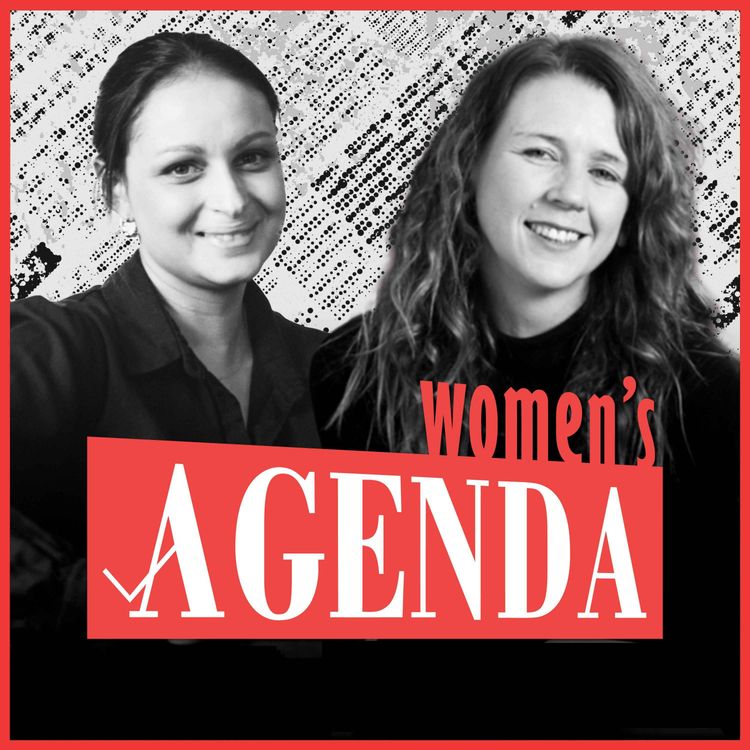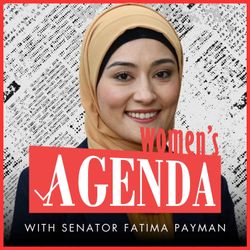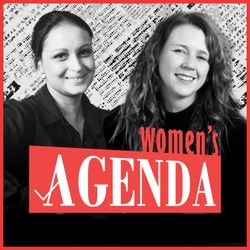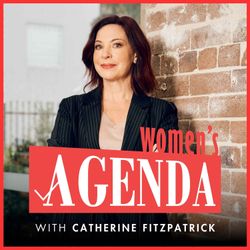Share

The Women's Agenda Podcast
New year, new women leaders?
Welcome back to The Crux for 2024! The team at Women's Agenda are well-rested and ready to get stuck back into reporting on the biggest issues faced by women in Australia and around the world.
In our first episode for 2024, we start with a couple of great wins, including Mar Galcerán becoming the first parliamentarian in Spain with Down syndrome, as well as Naomi Osaka's open vulnerability about returning to tennis after childbirth.
It's a record-breaking year for democracy around the world - but will we get proper representation of women leaders that we so desperately need? It doesn't look like it. Plus - how on earth are Australia's richest people making $1.5 million per hour? And how on earth do we stop it?
Stories from this week include:
- Mar Galcerán is Spain’s first parliamentarian with Down syndrome
- Naomi Osaka’s open vulnerability on tennis as a new mother is a win
- Men set to still dominate leadership this record-breaking election year but some firsts ahead for women
- Australia’s three richest people have made $1.5 million per hour since 2020. How on earth do we stop this?
The Crux is produced by Agenda Media, the 100% women founded and owned media business, publishing the daily news publication Women's Agenda.
More episodes
View all episodes

How to be brave, with Senator Fatima Payman
26:12|Senator Fatima Payman is not only one of the most productive members of parliament, but also courageous.As such, this conversation is all about how to be brave and courageous, even in the quieter moments and when the fear is present and inescapable.Born in Afghanistan, Senator Payman migrated to Perth with her family in 2003, studied pharmacy, and became president of Young Labor WA. In 2022, at just 27, she was elected as a Western Australian Senator for Labor, becoming one of the youngest senators in history and the first member of parliament to wear a hijab. Senator Payman crossed the floor in June 2024 over the Albanese Government’s Gaza response, seeing her indefinitely suspended from the Labor caucus. She quit the Labor party to sit as an independent. In January this year, Senator Payman announced she is expecting her first child in May. She will become the first Western Australian Senator to have a baby in office. This conversation was recorded in Januaray and some things may have changed. It also follows a piece Senator Fatima Payman penned as part of a collection of essays called A Time for Bravery: What Happens When Australia Chooses Courage? published by Australia Institute Press.
Falling from the glass cliff, confidence and ego
32:27|Australia has a new case of the glass cliff, with the (now former) Opposition leader being the latest high-profile woman to fall. We share how the events unfolded and why. Plus, we examine male confidence by exploring new research on how emotional openness changes across different ages for men. Finally, why does motherhood feel so lonely? We share the power of parent groups and why we're spending the next couple of months exploring how mothers connect. Topics discussed this week include: 1. Bad bunny’s superbowl show was an alternative joyful vision for America2. Angus Taylor is our new opposition leader. So, will there be a plan behind the man?3. From emotional openness to strength, this Male Confidence Index hopes to drive new conversations on men4. Why can motherhood feel lonely? Help us find out and change the experience
Epstein files? But You don't smile!
22:02|This week, we talk about the language, the theories and the networking in the Epstein files. From influential doctors with big social followings to royals, presidents and former prime ministers. Plus, a couple of wins, including why thousands of women will soon be arriving in Melbourne to talk about gender equity. Stories discussed this week include: Minnesota woman dragged from car by ICE agents gives testimony in DCWhy thousands of feminist leaders will soon arrive in MelbourneThe powerful men named in the latest Epstein files releaseThe influential doctor mentioned 1737 times in the Epstein files Trump lashes out at yet another female journalist who presses him on Epstein
Davos men, Coalition split, About those 'wine moms' and a Jan 26 idea
27:30|Wrapping up some of the top stories of the week we head to Davos, Canberra, Minnesota and back home again. On the agenda is extreme wealth, the lack of women at the World Economic Forum, the self-indulgence of some in politics and how "Wine Moms" became a thing and we also look at an excellent idea for addressing Jan 26. Key stories discussed this week include: Davos remains a festival of men despite (mostly) man-made risks we all faceSussan Ley “disrespected” us claim Nationals who have managed to make another week about themConservative media blame ‘wine moms’ as protests over ICE violence growWhy January 26 is not a date to celebrate and staying silent is not enough
Start drinking, as one EU leader suggested? No. Others ideas for a chaotic 2026
23:38|Hello 2026! And it's been a chaotic start already. Is the answer to start drinking, as one female EU leader suggested this week? We have a better idea instead. Also, Elon Musk’s Grok starts making thousands of sexualised deepfake images. Did we expect anything less? And why setting a health and wellness goal or intention for 2026 is a good idea. Plus, much more! This is our wrap of some of our biggest stories of the week. Stories discussed this week include: We don’t need a drink. We need more women in charge Grok, and how the algorithms aren’t psychologically safe for any of usWomen founders on their top health or wellness focus in 2026 — and whyThe Women's Agenda Podcast is produced by Agenda Media, publisher of Women's Agenda. Sign up for our free daily newsletter here and support our work by becoming a member here.
A week we will never forget
24:45|Australia is coming to terms with the horrific attack on the Jewish community in Bondi on Sunday night. Tarla Lambert-Patel and journalist Dinushi Dias sit down to unpack what happened, what it means and where we go next. They also break down some of the biggest stories on Women's Agenda this week. And find some hope in what has been a horrible week we will never forget. The Women's Agenda Podcast is published by Agenda Media, publisher of Women's Agenda. You can subscribe to our free daily lunchtime update and support our work.
Bring back 'masculine energy'! And is Pauline Hanson closing the gender pay gap?
25:45|Pauline Hanson gets Barnaby Joyce into the party, as well as a substantial pay rise as leader. Is that actually... a win? Also, the US co-founder calling for public hangings and for the world to get more "masculine energy". Plus, the social media ban is officially here, and everyone from teenagers to parents, politicians and media barons have something to say about it. And what's with the outrage over Anika Wells' travel expenses? We dive in. Stories discussed this week include: A rare case of a man’s move resulting in a woman getting a 100k pay bumpAnother billionaire tech bro declares world needs more ‘masculine energy’A social media ban won’t save us from harms online. Educating us willThe outrage over Anika Wells says more about us than it does about her
How everyday products and services are weaponised by perpetrators
32:37|Tech-facilitated abuse continues to grow as a dangerous part of gender based violence. This includes everyday financial products and services being weaponised by perpetrators to inflict harassment, terror and surveillance on their victims. One person who has been instrumental in examining the extent of the issue and how common services and products can do more to address this type of abuse, is Catherine Fitzpatrick She is a leading expert on disrupting financial abuse and gender biases through more innovative product and service design. And she joins the podcast for a fascinating but at times disturbing discussion on how this type of abuse is occurring, its prevalence, but then optimistically, the empowering actions both consumers and businesses can deploy to help stop it. Catherine has been leading industry-wide reforms. She’s advised the government on financial abuse policy and pioneered the financial safety by design framework, which is helping leading brands protect customers, manage risk and strengthen trust. She uncovered widespread abuse in online banking transactions while working as a banking executive in 2019, which led to her spearheading whole industry reforms to crack down on the practice. Catherine recorded this conversation with Women's Agenda on the 3rd December. And there’s much to learn, not just about how businesses and consumers can respond to the weaponisation of products and services, but also how she channelled a significant career curveball into a clear mission that is having real results. You can learn more about Catherine here.
An MP’s attention-seeking stunt for ‘women’s rights’ and a billionaire’s wild rant
20:02|Wrapping up another week on Women's Agenda, we explore the parliamentary stunt from a certain politician claiming she was supporting women’s rights. Plus, the wild rant from a billionaire claiming taxes almost "ruined" his life, and the reminder offered again this week that a woman celebrating epic success online can still trigger misogyny. Plus, we find the wins in the latest national snapshot from the Workplace Gender Equality Agency scorecard for Australia, where there has been an uptick in the share of paid parental leave being taken by men. The Women's Agenda Podcast is published by Agenda Media, the 100% all female owned and run media business. You can check out all the latest stories and discussed on our webste here.